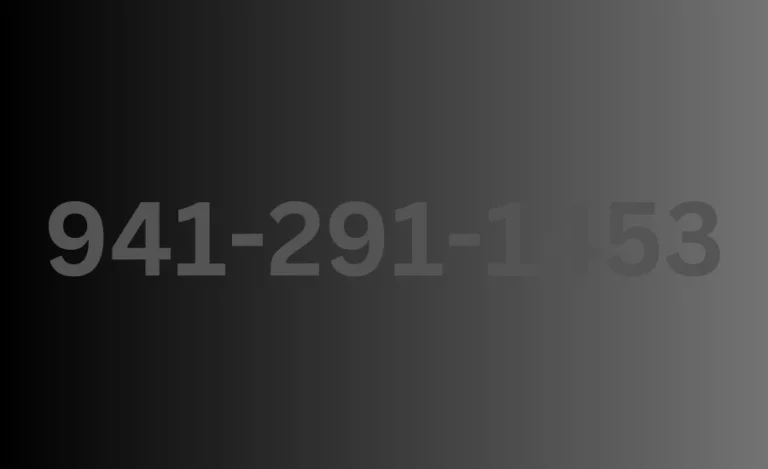941-291-1453 Receiving calls from unknown numbers—like 941-291-1453—has grown more frequent in the current digital era. Many of these calls might be innocuous, but some might be part of frauds or telemarketing campaigns. You’re not the only one who received a call from 941-291-1453. This guide offers helpful advice on how to respond to these calls appropriately, including how to recognize the caller, safeguard yourself against potential frauds, and what to do if you become the target of harassment.
Understanding the Area Code: What 941 Reveals About Your Call

Understanding the area code can help you understand important context when you receive a call from an unknown number. Southwest Florida is covered by the area code 941, which includes places like Sarasota, Bradenton, and Venice. Knowing this area code will enable you to determine the call’s approximate location, as well as perhaps provide information about the call’s origin and authenticity.
Identifying the Source of Calls from 941-291-1453: Key Possibilities
When you receive a call from a number like 941-291-1453, there are several potential sources to consider:
Personal Contacts: The call may be from a person you know, a friend or relative who resides in the 941 area or is visiting the area.
Local Businesses: If the call seems real, it might be from one of the following: appointment confirmations, service updates, or follow-ups on past conversations with businesses in the 941 region.
Telemarketers: This area code may also be used by telemarketers to place calls. Even though they’re not always malicious, these calls are frequently made without permission and could be an attempt to sell goods or services.
Scammers: Another possibility is that scammers are calling.They frequently use familiar area codes to appear more credible and to lure recipients into answering, with the intent of deceiving them.
How to Identify the Caller of 941-291-1453: Effective Methods
Reverse phone lookup programs can be quite helpful if you’re attempting to figure out who’s calling from 941-291-1453. With the help of these resources, you may input the caller’s phone number and obtain details about them, such as name, location, and any linked scam alerts.
Online Lookup Services: Platforms such as Whitepages, Truecaller, and Spokeo offer reverse phone lookup services. These websites can provide valuable details about the caller. Be aware that some services might charge a fee for more comprehensive reports.
Mobile Applications: Apps like Hiya and Truecaller not only help in identifying unknown callers but also offer functionalities to block unwanted calls. They include reverse lookup features to reveal the identity of the number owner.
Utilizing these tools can help you make informed decisions about how to handle the call from 941-291-1453 and ensure you protect yourself from potential scams or unwanted solicitations.
Investigating the Caller: Leveraging Online Databases and Community Insights
Another effective way to identify the caller from 941-291-1453 is by searching the number in online databases and community forums. Websites such as Who Calls Me, 800Notes, and Robocall Index offer platforms where users share and discuss information about unknown phone numbers. These forums can provide valuable insights based on collective experiences, helping you gauge whether the call is associated with legitimate businesses, telemarketers, or potential scams. By consulting these resources, you can gather additional context about the number and make more informed decisions about how to respond.
Uncovering Caller Information Through Online Searches and Social Media
Conducting a simple Google search or exploring social media platforms like Facebook and LinkedIn can often provide valuable information about unfamiliar numbers. By entering the phone number into search engines or social media search bars, you may uncover links to profiles, posts, or discussions that reveal details about the caller. This approach can help you identify the number’s owner or gain insights into the nature of the call, potentially leading to more context about its origin and purpose.
Best Practices for Handling Calls from Unknown Numbers
Generally speaking, you should avoid answering calls from unknown numbers. The majority of valid and significant calls will be followed by a text message or voicemail that contains the pertinent information and context.By allowing such calls to go to voicemail, you can screen them effectively and respond only if the message indicates that the call is of significance. This approach helps you avoid potential scams and unnecessary disruptions.
Handling Calls from 941-291-1453: Why Voicemail is Your Best Option
It is advisable to allow a call from 941-291-1453 go to voicemail if you receive one. Using this tactic, you can take your time listening to the message and determine if picking up the phone is worthwhile. Note that a lot of fraudsters and telemarketers frequently forget to leave voicemails, which may be a sign that the call is not genuine. Voicemail can serve as a filter to help you better guard against unsolicited or fraudulent communications.
Blocking Unwanted Calls: How to Manage Unwelcome Numbers
If you determine that a call from 941-291-1453 is unwelcome or raises suspicion, blocking the number can help prevent future interruptions. Here’s a quick tutorial on blocking that number on your phone:
For those using iPhones: Open your recent call history, hit the “i” symbol next to the concerned number, and choose “Block this Caller” from the list of alternatives.
For those using Android: To stop future contact, go to your recent calls on Android, press and hold the number, and select “Block/Report Spam.”
By blocking the number, you can effectively manage unwanted calls and reduce potential disruptions.
Recognizing Lottery and Prize Scams: What You Need to Know
Making a false claim that you’ve won the lottery or a prize is a typical scam. The con artists will tell you that before you can get your gains, you have to pay taxes or other expenses. It is noteworthy that valid lotteries and prize competitions never demand payment in order to provide a prize. Be cautious at all times and make sure such claims are genuine before acting upon them.
Identifying IRS Impersonation Scams: Key Points to Remember
One common scam includes con artists impersonating IRS officers.They may contact you, claiming that you owe money on taxes and threatening to take drastic measures if you don’t pay them right away. It’s crucial to remember that the IRS would never demand payment over the phone before sending you a formal notice through mail. Always verify the accuracy of such claims, and use the proper procedures to contact the IRS directly if you have any questions.
Reporting Suspicious or Harassing Calls: Steps to Take

If you suspect that a call is part of a scam or involves harassment, it’s important to take action by reporting it to the appropriate authorities. Here’s how you can address such issues:
Federal Trade Commission (FTC): Visit the FTC’s website to report unwanted calls, including robocalls and suspected scams. The FTC provides resources to help you handle and report these types of calls effectively.
National Do Not Call Registry: You can submit a complaint with the registry if you are enrolled on it and you get unsolicited calls from telemarketers. This facilitates the enforcement of the registry’s rules against companies that breach them.
Local Law Enforcement: For calls that are threatening or involve harassment, contact your local police department. They can offer guidance, and if necessary, initiate an investigation to address the issue.
Taking these steps can help you manage and mitigate the impact of unwanted or dangerous calls.
Recognizing and Avoiding Prize Scams
Fake lottery or prize claims with a catch—that you have to pay tax or other fees before you can receive your winnings—are a popular scam. Real lotteries and prize competitions never demand money in order to award winnings. Take caution if you get such a notification.Authentic organizations will not ask for upfront payments or personal information to award a prize. Always verify the legitimacy of any prize claim and remember that legitimate prizes do not come with hidden costs.
Reporting Scam Calls: Additional Steps for Effective Action
It is imperative that you notify not just the Federal Trade Commission (FTC) but also your state’s Attorney General and the local consumer protection office of your concern. You can assist authorities in better tracking and addressing fraudulent actions by informing these entities about the scam. This cooperative strategy supports both the fight against scams and larger initiatives to shield customers from dishonest business practices.
Monitoring Your Credit for Signs of Identity Theft
It’s critical to routinely check your credit reports for any strange behavior in order to protect yourself against identity theft. You have the right to get a free copy of your credit report from Equifax, Experian, and TransUnion, the three main credit bureaus, once a year. You may quickly identify any illegal accounts or changes that might point to identity theft by monitoring these reports, which will enable you to take immediate action to safeguard your financial stability.
FAQ’s
When you get calls from numbers you don’t recognize, like 941-291-1453, you might be concerned about frauds or unsolicited calls. It’s best to let unknown callers go to voicemail in order to handle these calls efficiently. This way, you can determine the legitimacy of the caller later. To prevent more disruptions, think about blocking the number if the call seems suspect.
To identify the caller, use reverse phone lookup services and online databases, which can provide valuable information about the caller’s identity. If you suspect that the call is part of a scam or involves harassment, report it to the Federal Trade Commission, your state’s Attorney General, or local law enforcement.
Be cautious while answering unwanted calls and make sure the caller is who they say they are before disclosing any personal information. To protect your financial stability, if you become a victim of a scam, get in touch with your bank right away, report the incident, change your passwords, and routinely check your credit reports.
For More Information Check This Celebz Wave

